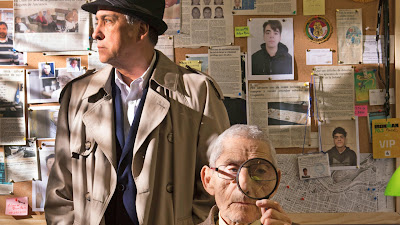Makes a change to have some nice, heartwarming news coming out of care homes. The Mole Agent is a documentary with a difference, in that it's been styled as light comic detective fiction, complete with formal and plot elements you'll have to swallow or play along with; I was charmed enough to do so, more so when I realised where its trail of clues was headed. At its centre is a vaguely professorial, 83-year-old Chilean, Sergio, recruited by a detective agency to go undercover in a care home for three months to investigate claims of institutional neglect. (The jolly tone struck from the outset reassures us we're not in for some grim, Panorama-style exposé.) This requires a cover story and technology lessons for our hero, who can't tell his What's App from his FaceTime and of course still has the sound activated on his phone keyboard while texting. It also requires a cover story for director Maite Alberdi and her camera crew, invited into the home to follow this new recruit's progress. In doing so, the film establishes a hierarchy of watchers. Upfront, there's Sergio, with his spy glasses and camera pen, using the advantages that follow from his relative sprightliness to keep an eye on the care home's residents. Lurking in the care home bushes or outside an opened door, there's Alberdi's crew, looking out for Sergio, lest he get in too deep. Given that he's voted king of the nursing home within weeks of his arrival, and sets the hearts of several of the care home's single ladies aflutter, this seems more than likely.
From an early stage - possibly as early as the opening scene in the detective's office, lit like no other detective's office outside the realms of film noir - you'll have to make your peace with how much of Alberdi's film is 100% fly-on-the-wall truth and how much of it is a construction set up for the purposes of entertaining yarnspinning. Sergio proves hardly the most circumspect of spies, and I was never sure how sending a camera crew to follow him around for what feels like every hour of the day was meant to assist him in compiling a damning case against this particular institution. The game may be up on that front the moment we witness a typically unflustered conversation in the care home director's office from two distinct angles: clearly, the degree of access Alberdi was granted was far greater than she'd get from a care home with real skeletons in its closets. What's peculiar is that, even within this broadly benign framework, Sergio still uncovers evidence of some form of neglect, or at least institutional off-days: bedbound patients who don't seem to be receiving the attention they perhaps need, a vast pile of washed clothes that speaks, if not to criminal matters, then to a faintly lax approach to basic care home management. The resident Sergio has been sent out to make contact with and monitor seems especially frail and nervy, so much so that she's disappeared out of the story around the halfway mark: it's unclear whether her condition is the care home's doing. Still, my personal view was that it was OK if Alberdi had asked these residents to play roles, or recreate scenes from real-life events. At the very least, it would have been a fun way to spend a few afternoons.
That time, both endless and limited, is what The Mole Agent is really getting at. To some degree, Alberdi arrived at this care home with ulterior motives: her detective fiction (which may finally be no more than fiction) is but a means of making a film about those who've been shut away, rendered invisible - with, as we've seen from recent British headlines, potentially tragic consequences. Watching this detective is Alberdi's way of hearing out their stories, and revealing their personalities, from Sergio's doddering yet dogged Sam Spade to the variety of dames, tough and tender, he encounters on his quest towards whatever the film defines as its truth. That noirish framing is itself but cover for the far more conventional documentary business of observing the interactions of individuals in a specific place - though it carries the extra poignancy here of observing what's likely to be the residents' final place of residence, and many individuals who've already run out of people with which to interact. Perhaps inevitably, given the age of the participants, there's some circling around and repetition, more than a few conversations that don't particularly go anywhere, but also plenty of the insight that follows from close, sustained, on-the-ground study. I was struck by the near-childlike innocence and simplicity displayed by Alberdi's subjects: it's as though that need for drama and over-complication by which we waste so much of our adult lives (and which, I fear, comes as standard with an active sex drive) has been stripped away, leaving the home's residents free to communicate directly, plainly, honestly. What PI Sergio was finally gathering, it seems, was further evidence that we go out of this world as we come in, no less in need of someone to hold, guide and watch over us: even the walkers via which the residents shuffle up and down the care home corridors - this geriatric noir's equivalent of getaway cars - are the same.
The Mole Agent opens in selected cinemas, and will be available to stream, from Friday.

No comments:
Post a Comment